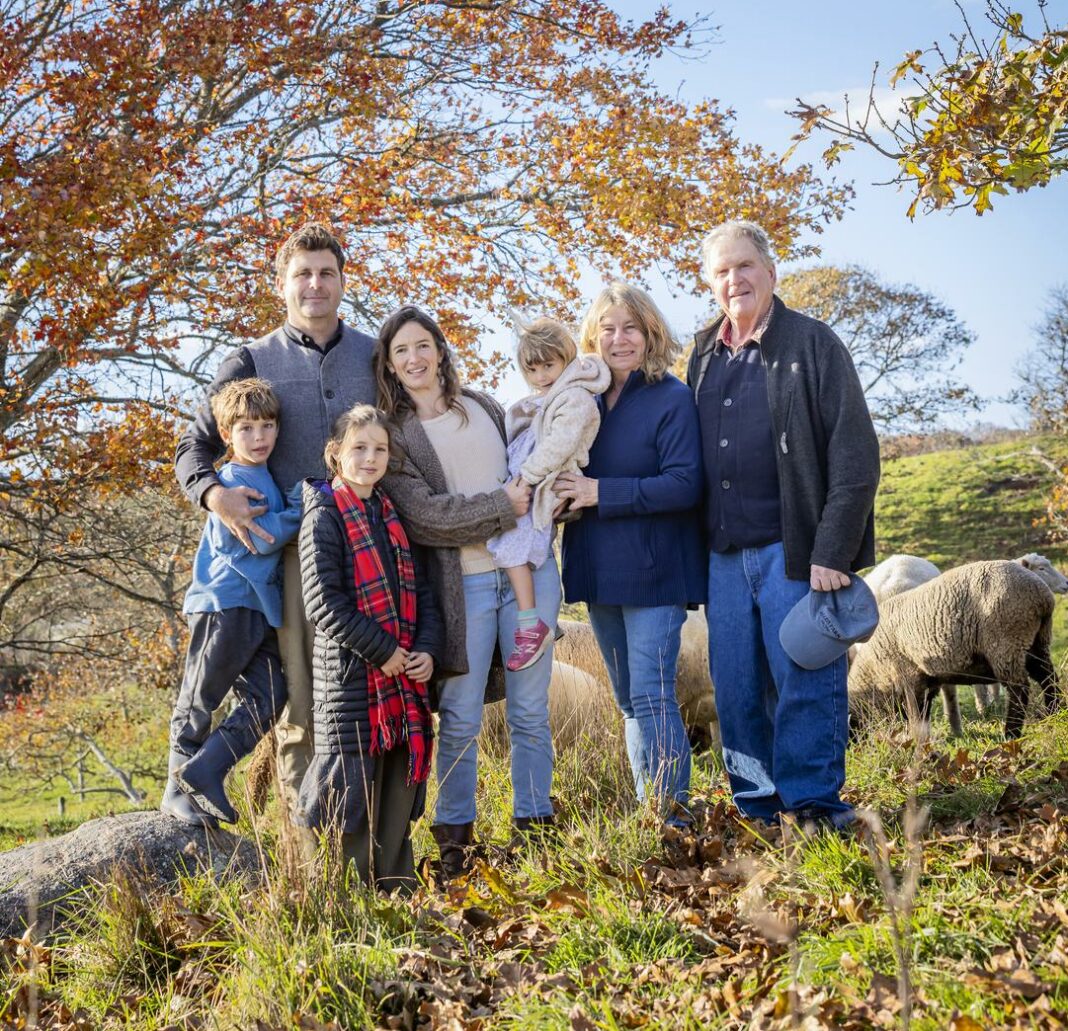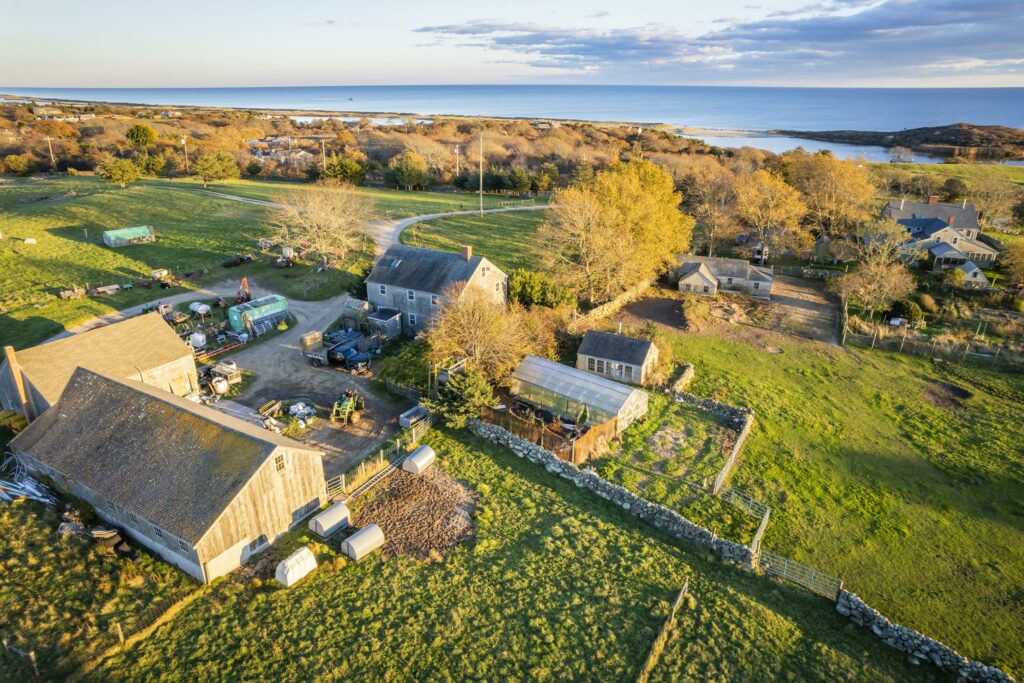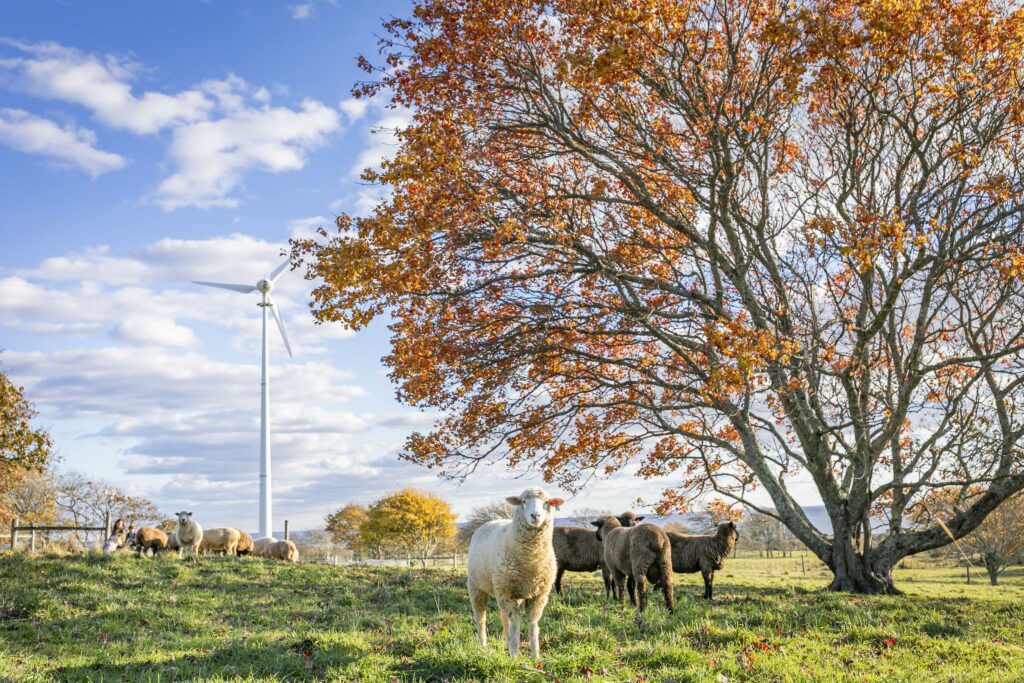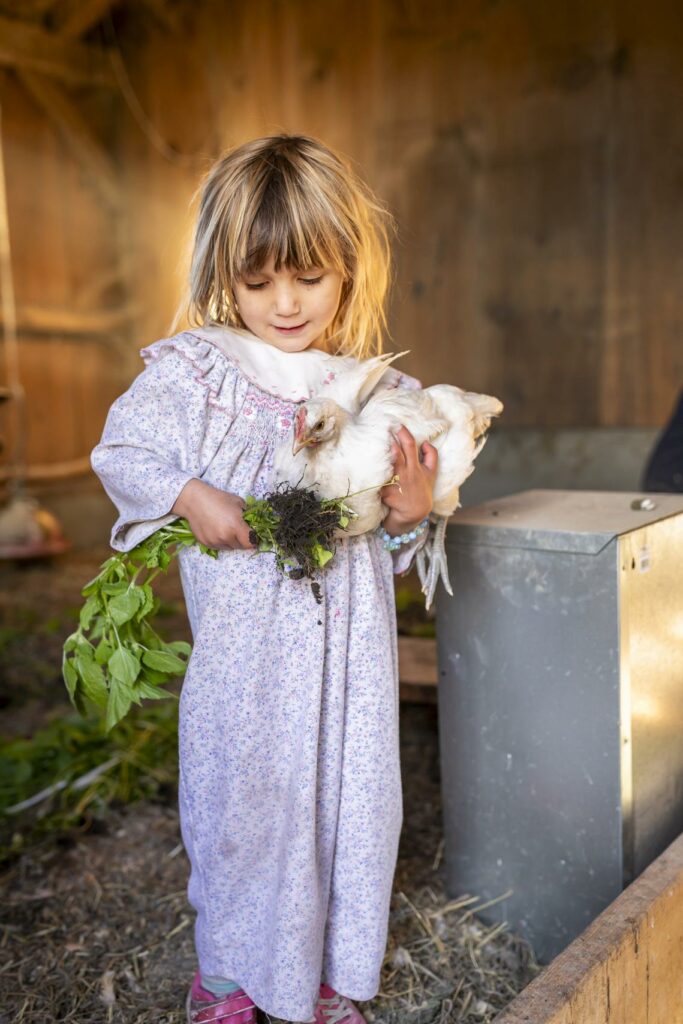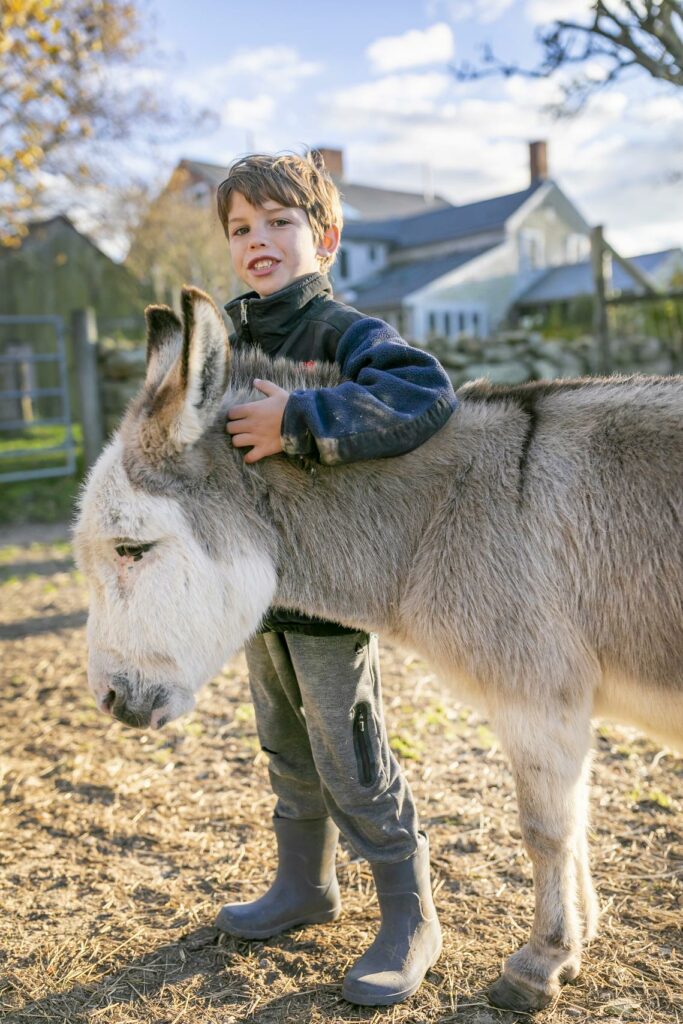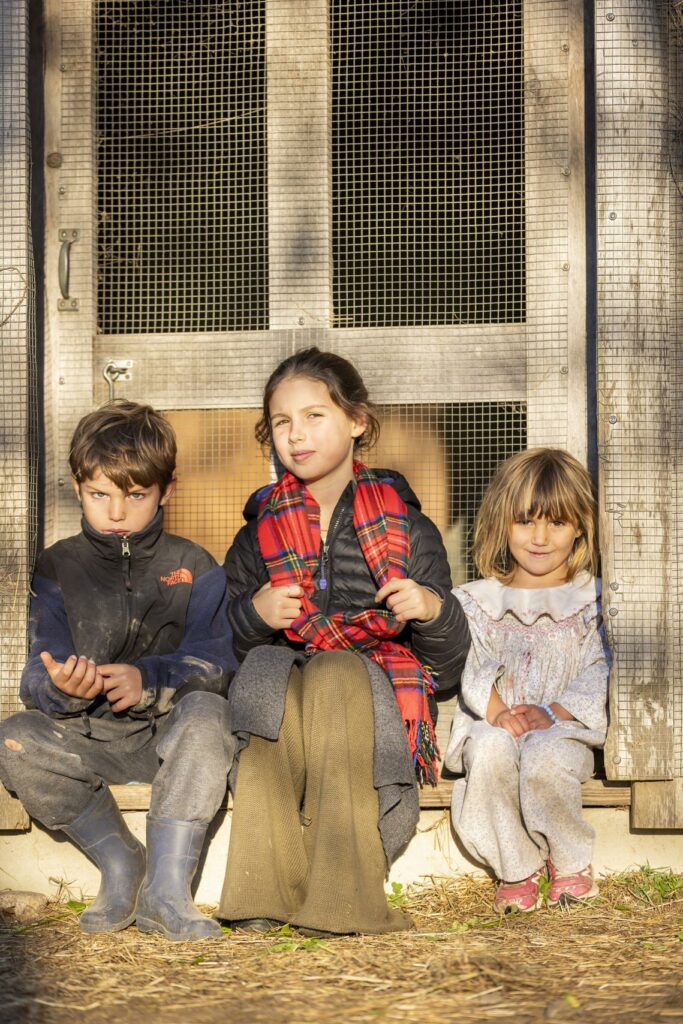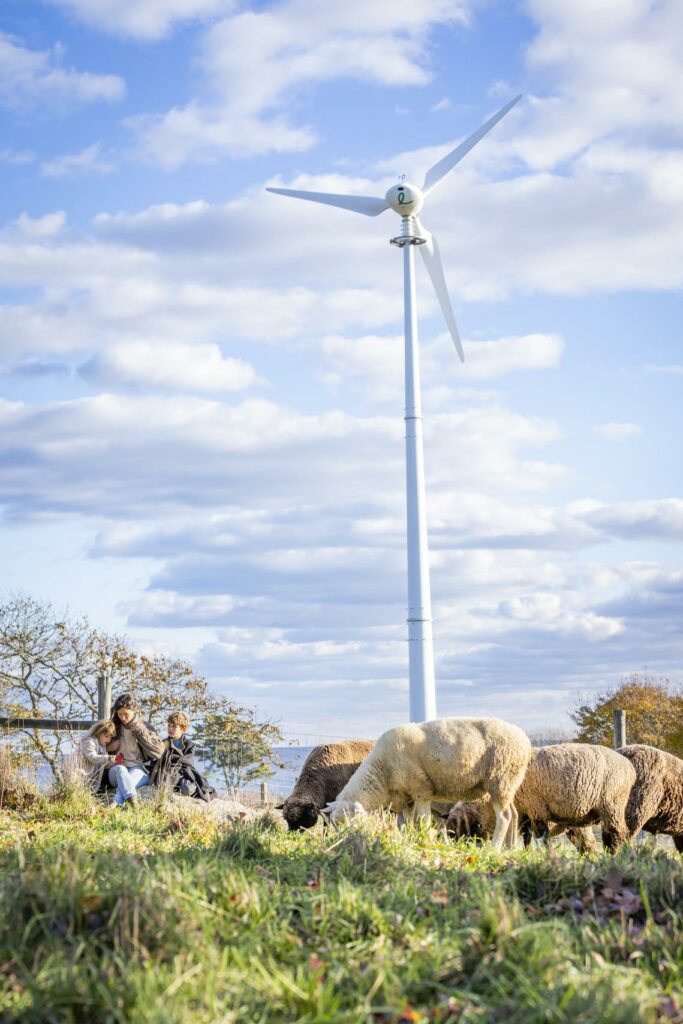It takes a tightly-woven family to sustain this centuries-old Chilmark sheep farm.
Since 1762, more than thirteen generations of Islanders have dug the earth, tended the flock, and sheared the wool at the Allen Farm. Now the next generations of farmers, who share the same lineage and the same passion, are stepping in.
I was lucky enough to take a trip up to Chilmark to visit the Allen Farm with photographer Randi Baird on a recent warm weekend afternoon. I got out of my car and heard sheep bleating in the distance, chickens clucking in their coops, and the squeals and laughter of young children — the newest generation — playing together. I met Clarissa Allen and Mitch Posin, and they introduced me to their son, Nathaniel, and his wife, Kaila, who have recently taken over as the farm managers.
With a bit of work, the adults managed to gather together Kaila and Nathaniel’s children, Arlo, Tavira, and Florence, for a family walk.
Mitch donned an Allen Farm baseball hat and one of the original Allen Farm wool vests, and we strolled toward the rear of the property. “The only way families are going to continue their legacies,” Mitch told me, “is if the person you want to pass the torch to is willing to pick it up and run with it. It seems to happen more here on the Island — the Athearns, the Fischers, the Whitings, and us. But things have definitely evolved in the past few years.”
Around the country, industrial agriculture continues to push local, family-owned farms out of business; Mitch said he is proud to see the next generation take ownership of the farm, and begin to make it their own. For decades, Mitch and Clarissa were the sole workforce on the farm. With Kaila, Nathaniel, and the little ones now involved, Mitch said the operation runs a lot more smoothly. “We’ve got twice the number of hands, and everyone wants to pitch in,” he said.
He looked out over the green pastures and smiled. “You should have seen this place three or four years ago. Totally a night-and-day difference.”
The only way families are going to continue their legacies is if the person you want to pass the torch to is willing to pick it up and run with it.
–Mitch Posin
He explained that the Allen Farm has been experimenting with some farming techniques in recent years. They use mob grazing, an advanced form of rotational grazing, that puts a lot of animals in a small plot of land for a short period of time. This technique increases biodiversity, reduces the risk of overgrazing, and minimizes the need for fertilizers. And they’re trying out a practice called silvopasture, which integrates shade trees into pastureland to keep the animals comfortable and improve soil biology. The shade from the trees increases moisture retention and mitigates the amount of moisture that’s wicked away by the wind. “More moisture equals a better soil biota, which equals more grass, which equals better sustenance for the animals,” Mitch said.
Over the decades, The Allen Farm has become well known for its soft and beautifully-colored wool. Clare Ives, a talented local weaver, has used the family’s industrial loom to craft custom throws for three decades. After so many years on the farm, Clare has become an integral part of the operation, and part of the family. In about 1988, Valerie Beggs helped Mitch design the first version of the famous Allen Farm wool vest. The farm has also long been known for wool blankets and sweaters.
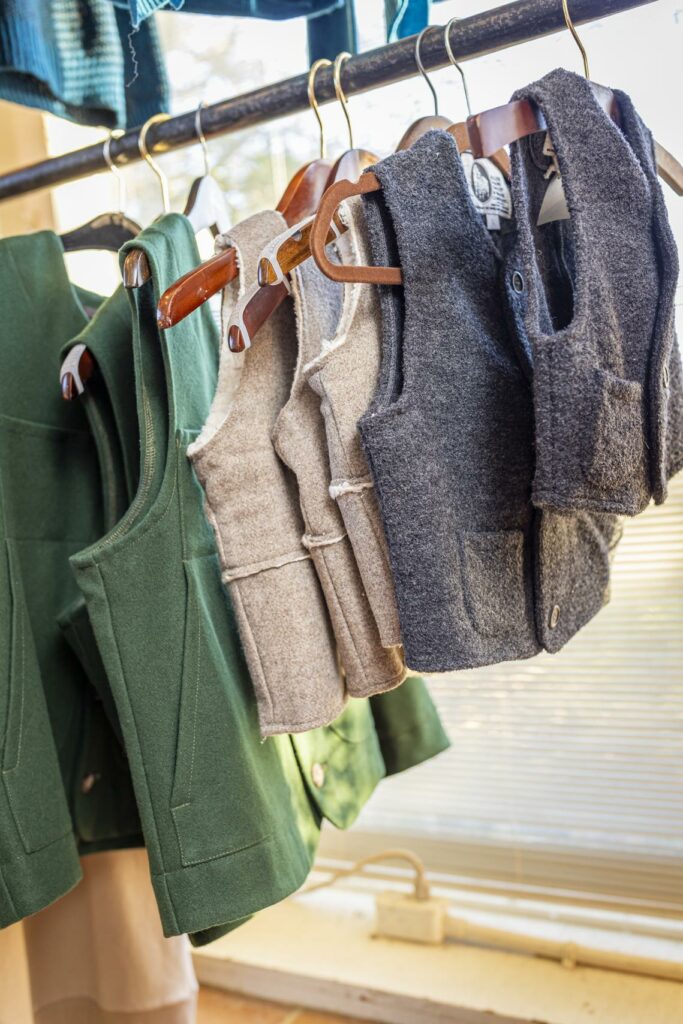
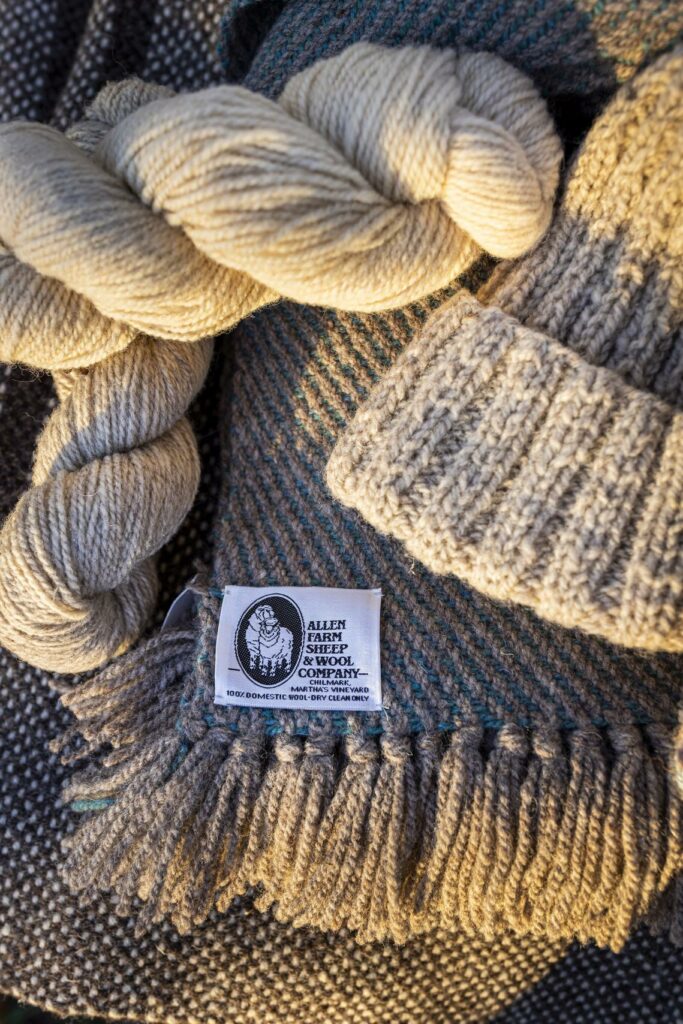
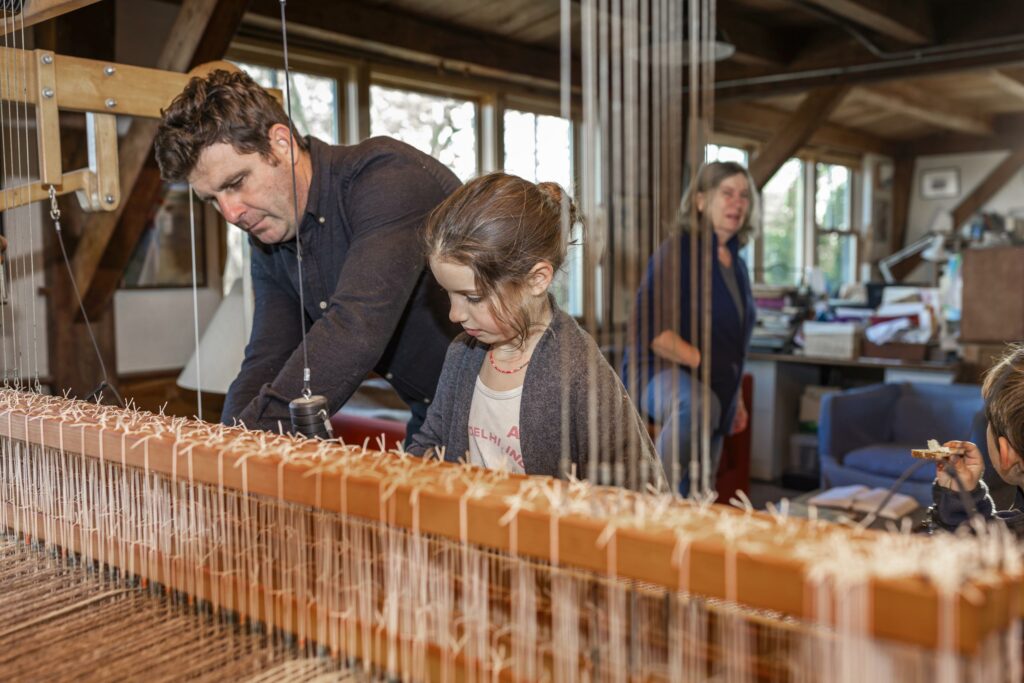
The meat the farm produces is just as sought-after as the wool textiles. Mitch looked over to the chicken coops. “We do a lot of meat and egg birds each year. In total, we have about one hundred and fifty meat birds in the freezer to sell over the winter, then we have about seventy laying hens and a bunch of roosters,” he said. “It’s a lot of work, but we love this life.” The farm’s lamb (often seen on upscale Island restaurant menus, but also for sale to the public) is so popular that the family has to space out meat sales so they don’t sell out.
While encouraging the kids to smile for Randi’s camera, Clarissa said that having the entire family on the farm together is a blessing that she refuses to take for granted. “Our son has always had a deep commitment to the farm,” she said, “and now Kaila is here with him, and they are taking this on together.” She added that, for her son, taking over the lead role on the farm has been a clarifying point in his life. “I remember, toward the end of his college career, Nathaniel said ‘you know what, looking back, I think it would have been a better investment to spend that tuition money on a tractor.’”
Clarissa has spent almost all of her life on the farm, and she said she wants to offer that same option to her children and grandchildren. Even with the challenge of negotiating a modern system that often disincentivizes family farming, Clarissa and her family have managed to hold it all together, and to grow together.
After tossing down a bag of grain for some hungry ewes, Nathaniel said his family farm has long been a place where local knitters come to showcase their craft. Along with those items, the farm shop sells blankets that Clare weaves on the family loom and a wide range of other goods. The bulk of the farm’s wool is sent off-Island to be processed and used to create Allen Farm products. Shearers Andy Rice and Aaron Loux shear the sheep at the end of May — usually about fifty ewes. The wool is sent to a wool broker to get scoured, then the white wool heads to South Carolina and the black wool heads to North Carolina to be treated. After that, it’s all sent to a spinnery, then it’s made into the famous Allen Farm vests, sweaters, and other clothing.
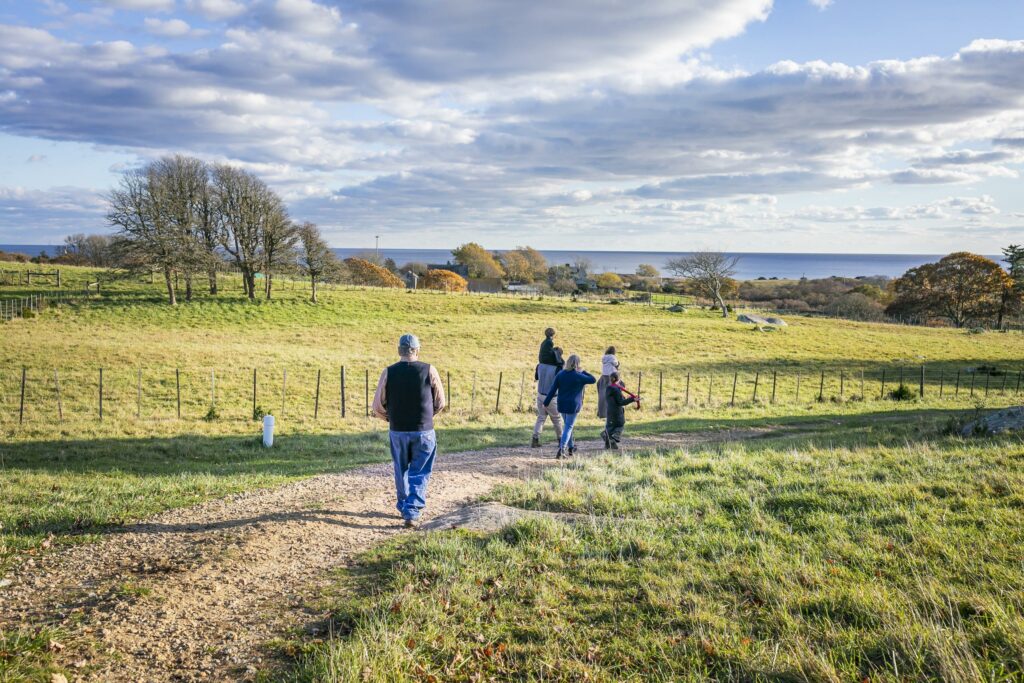
Nathaniel said that this time of season, they take the sheep out of rotational grazing while the grass is dormant, and place them in a pasture with two bunk feeders filled with hay until the next crop of lambs are born. When the grass grows back around the middle of May, the sheep will go right back out to pasture until the end of November. “It’s all very cyclical,” Nathaniel said. “That allows us to focus on different things during different parts of the year, and we can integrate more of the regenerative techniques that we have learned.”
One thing my parents made sure of when I was little was to never force me to do morning or evening chores. They said this life is a choice, and I want to offer that opportunity to my children.
–Nathaniel Allen-Posin
After plopping Arlo down from his shoulders and penning in the sheep, Nathaniel said that, although farming is hard work, he wouldn’t choose any other path. He stressed that a life and a livelihood like this has to be a conscious choice, and although he would love his kids to pick up where he and Kaila leave off, he wants them to forge their own paths. “One thing my parents made sure of when I was little was to never force me to do morning or evening chores. They said this life is a choice, and I want to offer that opportunity to my children.”
As the sun began to set, and a chill crept in across the moorland, Kaila was busy in the barn getting Florence geared up for a quick ride on one of the horses. “After college, I studied permaculture — sustainable agriculture systems,” Kaila said. “I felt so grateful for the opportunity to jump into an amazing historic farm alongside my husband.” Kaila said the openness and warmth she immediately felt from Clarissa and Mitch was inspiring, and the two encouraged her to make her own mark on the farm. “I started a little garden next to the greenhouse, and over the years my role just grew and grew,” Kaila said. When she’s not caring for her kids, Kaila helps Clarissa manage the shop, sources local vendors, and dreams up new and creative ways to use the farm’s wool. A few years back, Kaila designed a special-edition Allen Farm Woolrich blanket. She said she loves getting a chance to see customers come into the shop and marvel at the finished products. Kaila also manages the farm’s poultry production — a role she enjoys just as much as working the retail end of things.
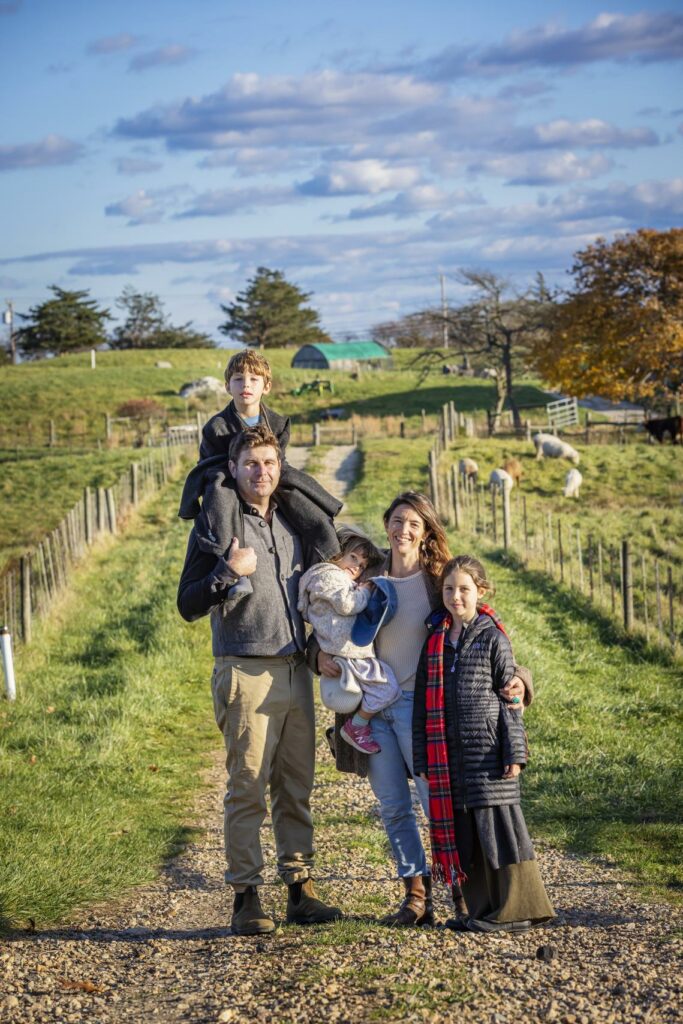
Kaila is an experienced garden- and place-based educator on the Island. After working for Island Grown Schools until 2016, she and her sister founded a homeschool cooperative called At Home in the Woods, which allows kids ages two through seven to immerse themselves in and learn from their environment year-round.
At some point, my kids won’t need me looking after them as much. But this place will always need me, and I will always need this place.
–Kaila (Binney) Allen-Posin
At this point in her life, Kaila said it’s not hard to recognize the blessings that surround her and her family. “We really understand our natural world, and where our place is in that world,” she said. As she watches her children grow, Kaila has noticed that each of them has already naturally assumed a special role on the farm. Tavira is the herbalist of the family and an avid gardener; Arlo is the technician, always wanting to take rides on the tractor with his father; and Florence has become quite the equestrian. “The farm is endless work, with a little bit of chaos thrown in,” Kaila laughed as Tavira played with one of the donkeys. “At some point, my kids won’t need me looking after them as much. But this place will always need me, and I will always need this place.”
Allen Farm, 421 South Road, Chilmark. Visit allenfarm.com for info about shop hours, meat and eggs for sale.

